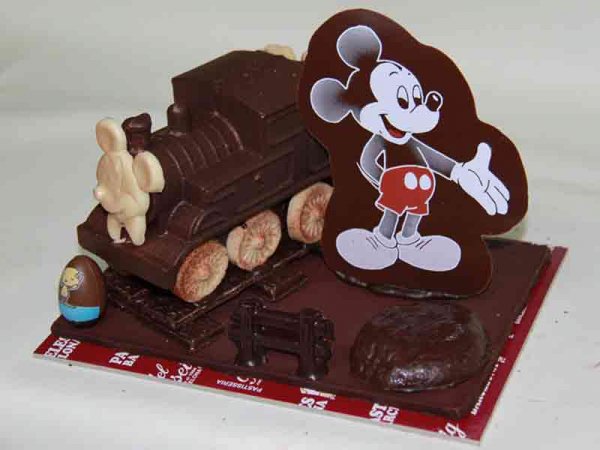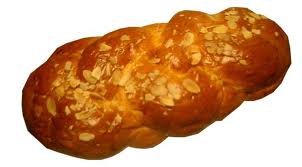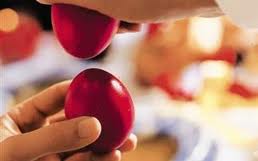|
ESL Forum:
Techniques and methods
in Language Teaching
Games, activities
and teaching ideas
Grammar and
Linguistics
Teaching material
Concerning
worksheets
Concerning
powerpoints
Concerning online
exercises
Make suggestions,
report errors
Ask for help
Message board
|
ESL forum >
Message board > HAPPY EASTER 2011! In Spain we eat the famous and traditional "Mona de Pascua"
HAPPY EASTER 2011! In Spain we eat the famous and traditional "Mona de Pascua"
|

paola10

|
HAPPY EASTER 2011! In Spain we eat the famous and traditional "Mona de Pascua"
|

|
24 Apr 2011
|
|
|
|

maryse pey�

|
|
Hi dear Paola,
if �Pascua � means �Easter � and �de � �of � what does �Mona � mean, please ?
Is it used for �chocolate sweet or dessert � as your photo shows ?
HAPPY EASTER !
Maryse.  |
24 Apr 2011
|
|
|

paola10

|
|
Hi Maryse I don�t Know what is the appropiate meaning of `Mona�in English , but I can explain you that this is a typical cake or chocolate sweet we eat on Easter Day in Spain. Nowadays not only we find Chocolote Eggs here, but a lot of famous characters, sports players, singers, politicians are made in chocolate. They are Marvellous works of Art... HAPPY EASTER DEAR MARYSE!
|
24 Apr 2011
|
|
|

magneto

|

Since we �re on the topic of Easter traditions, here goes:
In Greece we have "tsoureki", a delicious type of mastiha-flavoured cake or bread (call it what you will - there �s no exact equivalent in other countries, I think):  and we "smash" red-dyed hard-boiled eggs against each other (not with force or anything - just like this: and we "smash" red-dyed hard-boiled eggs against each other (not with force or anything - just like this:  ). The customary way of doing it is "tip-to-tip" and "butt-to-butt" (pardon my French, but this is how it �s called) and the one whose egg remains untouched wins...Well, doesn �t really win anything - it �s just said that he/ she will have good luck. ). The customary way of doing it is "tip-to-tip" and "butt-to-butt" (pardon my French, but this is how it �s called) and the one whose egg remains untouched wins...Well, doesn �t really win anything - it �s just said that he/ she will have good luck.
We also have skewered lamb or kid (which I find absolutely barbaric and will not show you any pictures of - I don �t eat it myself), "mageiritsa", which is a soup made of lamb intestines, liver and greens (which is also pretty barbaric if you think about it, but you don �t actually see the whole animal on a skewer and, well, it �s really tasty - and a bit hard to digest, perhaps ) )
That �s as far as food is concerned.
Other traditions include fireworks (which may be risky sometimes as gunpowder can be an uncontrollable material), the "burning of Judas" (in some places that can be pretty risky as well, because "Judas" is actually dynamite wrapped in clothes) and the breaking of clay jars filled with water (which is a tradition kept in Corfu, so our friends from Corfu may be able to tell us more on the topic).
My personal favourite is the tradition of the "Epitaph", which is held on the night of Good Friday. A decorated table, which is supposed to be carrying Christ�s dead body is taken around towns in memory of Christ�s suffering and sacrifice and people are chanting hymns and prayers. This is particularly beautiful on the island of Skiathos (where I come from, so I may be a bit prejudiced on the matter), where the litany takes place at three in the morning between Good Friday and Good Saturday and ends at sunrise.
I find this to be the most touching part of Easter celebrations, as I �m not a very religious person in general and, to me, the true message of Easter is that of a person willingly sacrificing himself/ herself for the greater good, which is something the world is lacking in these days.
I �d love to hear more about Easter traditions in other countries if anyone would like to share them with us.
|
24 Apr 2011
|
|
|

maryse pey�

|
|
Hey ! all those cakes look terrific ! Why not share a piece of each ?
Thanks for the sympathetic explanations all of you.
Here in France people making chocolate pieces for Easter outdo in imagination to put marvels of every kind of shapes, colors, characters typical of Easter (eggs, rabbits, chickens, bells....) or famous on tv (cartoon characters...).
We have enormous chocolate eggs with surprises (toys for girls or boys) in them.
Christians go to church for the Easter blessings. Then we share lunch with our family. Very often there is a leg of lamb as meat.
There are no fireworks but the windows of our shops are full of nice puppets, Easter Bunnies, colored and smiling chickens, white lambs...
Maryse. |
24 Apr 2011
|
|
|

Yolandaprieto

|
|
"La Mona de Pascua" is a tradition, as far as I know, in Catalonia and perhaps in some other nearby regions. I am from Castilla and we have lots of different sweet things to eat but the most characteristic tradition in this part of Spain and the South too are the processions, which most people live as a very important part of Easter. People carry statues of saints around on floats or wooden platforms. Marchers wear clothes which are meant to depit the Nazarenos, people from Nazareth. The religious fraternities and brotherhood are responsable for carrying the statues and organizing the penitents and musicians. The Nazarenos follow the people who carry the floats bearing scuptures and models of biblical scenes.
Hope I didn �t bore you
Yolanda |
24 Apr 2011
|
|
|

dawnmain

|
|
Here In galicia in the north west and in madrid people traditionally eat "roscon" (dont know about the rest of spain) - which looks very much like your greek tsoureki. and of course nowadays chocolate eggs.
|
24 Apr 2011
|
|
|









 and we "smash" red-dyed hard-boiled eggs against each other (not with force or anything - just like this:
and we "smash" red-dyed hard-boiled eggs against each other (not with force or anything - just like this:  ). The customary way of doing it is "tip-to-tip" and "butt-to-butt" (pardon my French, but this is how it �s called) and the one whose egg remains untouched wins...Well, doesn �t really win anything - it �s just said that he/ she will have good luck.
). The customary way of doing it is "tip-to-tip" and "butt-to-butt" (pardon my French, but this is how it �s called) and the one whose egg remains untouched wins...Well, doesn �t really win anything - it �s just said that he/ she will have good luck. )
)



